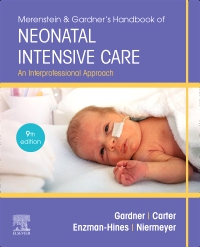
Merenstein & Gardner's Handbook of Neonatal Intensive Care - Elsevier eBook on VitalSource, 9th Edition
Elsevier eBook on VitalSource

Co-authored by an interprofessional collaborative team of physicians and nurses, Merenstein & Gardner’s Handbook of Neonatal Intensive Care, 9th Edition is the leading resource for interprofessional, collaborative care of critically ill newborns. It offers comprehensive coverage with a unique interprofessional collaborative approach and a real-world perspective that make it a practical guide for both nursing and medical students alike. The new ninth edition features a wealth of expanded content on delivery-room care; new evidence-based care "bundles"; palliative care in the NICU; interprofessional collaborative care of parents with depression, grief, and complicated grief; and new pain assessment tools. Updated high-quality references have also been reintegrated into the book, making it easier for students to locate research evidence and standards of care with minimal effort. These additions, along with updates throughout, ensure that students are equipped with the very latest neonatal clinical care guidelines and practice recommendations — all in a practical quick-reference format for easy retrieval and review.
Newer Edition Available
Merenstein & Gardner's Handbook of Neonatal Intensive Care - Elsevier eBook on VitalSource
-
- NEW! Updated content throughout reflects the latest evidence-based practice, national and international guidelines, and current protocols for interprofessional collaborative practice in the NICU
- NEW! Up-to-date, high-quality references are now reintegrated into the text for quick retrieval, making it easier for students to locate research evidence and standards of care with minimal effort
- NEW! Expanded content on delivery-room care includes the impact of staffing on quality of care, delayed cord clamping, resuscitation, and more
- NEW! Coverage of new evidence-based care "bundles" keeps students up to date on new guidelines that have demonstrated improved outcomes of very preterm infants
- NEW! Expanded coverage of palliative care in the NICU and new pain assessment tools equip future NICU providers with essential resources for maintaining patient comfort
- NEW! Expanded coverage of interprofessional collaborative care of parents with depression, grief, and complicated grief prepares students for their role in this essential area of practice
- UNIQUE! Core author team of two physicians and two nurses gives this internationally recognized reference a true interprofessional collaborative approach that is unmatched by any other resource
- Consistent organization within clinical chapters includes Physiology/Pathophysiology, Etiology, Prevention, Data Collection (History, Signs and Symptoms, and Laboratory Data), Treatment/Intervention, Complications, and Parent Teaching sections
- UNIQUE! Color-highlighted point-of-care clinical content makes high-priority information quick and easy to find
- UNIQUE! Parent Teaching boxes outline the relevant information to be shared with a patient’s caregivers
- Critical Findings boxes outline symptoms and diagnostic findings that require immediate attention to help the provider prioritize assessment data and steps in initial care
- Case Studies demonstrate how to apply essential content to realistic clinical scenarios for application-based learning
-
- NEW! Updated content throughout reflects the latest evidence-based practice, national and international guidelines, and current protocols for interprofessional collaborative practice in the NICU
- NEW! Up-to-date, high-quality references are now reintegrated into the text for quick retrieval, making it easier for clinicians to locate research evidence and standards of care with minimal effort
- NEW! Expanded content on delivery-room care includes the impact of staffing on quality of care, delayed cord clamping, resuscitation, and more
- NEW! Coverage of the new evidence-based care "bundles" keeps clinicians up to date on new guidelines that have demonstrated improved outcomes of very preterm infants
- NEW! Coverage of new pain assessment tools equips NICU providers with essential resources for maintaining patient comfort
- NEW! Expanded coverage of palliative care in the NICU provides the tools needed to ensure patient comfort
- NEW! Expanded coverage of interprofessional collaborative care of parents with depression, grief, and complicated grief prepares clinicians for this essential area of practice
-
Unit One: Evidence-Based Practice
1. Evidence-Based Clinical Practice
Unit Two: Support of the Neonate
2. Prenatal Environment: Effect on Neonatal Outcome
3. Perinatal Transport and Levels of Care
4. Care at Birth
5. Immediate Newborn Care
6. Heat Balance
7. Physiologic Monitoring
8. Acid-Base Homeostasis and Oxygenation
9. Diagnostic Imaging in the Neonate
10. Pharmacology in Neonatal Care
11. Drug Withdrawal in the Neonate
12. Pain and Pain Relief
13. The Neonate and the Environment: Impact on Development
Unit Three: Metabolic and Nutritional Care of the Neonate
14. Fluid and Electrolyte Management
15. Glucose Homeostasis
16. Total Parenteral Nutrition
17. Enteral Nutrition
18. Breast Feeding the Neonate with Special Needs
19. Skin and Skin Care
Unit Four: Infection and Hematologic Diseases of the Neonate
20. Newborn Hematology
21. Jaundice
22. Infection in the Neonate
Unit Five: Common Systemic Diseases of the Neonate
23. Respiratory Diseases
24. Cardiovascular Diseases and Surgical Interventions
25. Neonatal Nephrology
26. Neurologic Disorders
27. Genetic Disorders, Malformations, and Inborn Errors of Metabolism
28. Neonatal Surgery
Unit Six: Psychosocial Aspects of Neonatal Care
29. Families in Crisis: Theoretical and Practical Considerations
30. Grief and Perinatal Loss
31. Discharge Planning and Follow-Up of the Neonatal Intensive Care Unit Infant
32. Ethics, Values, and Palliative Care in Neonatal Intensive Care


 as described in our
as described in our 